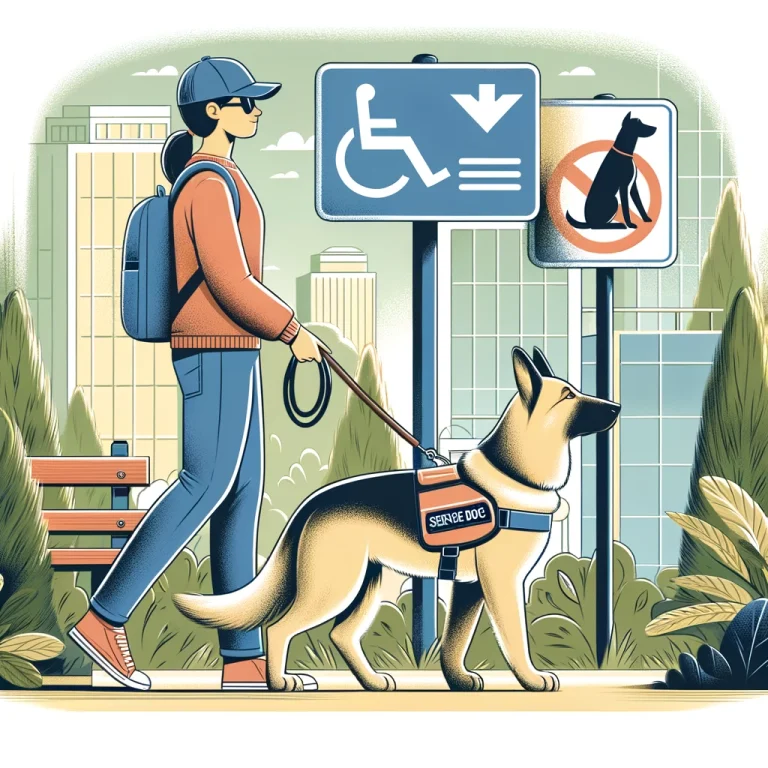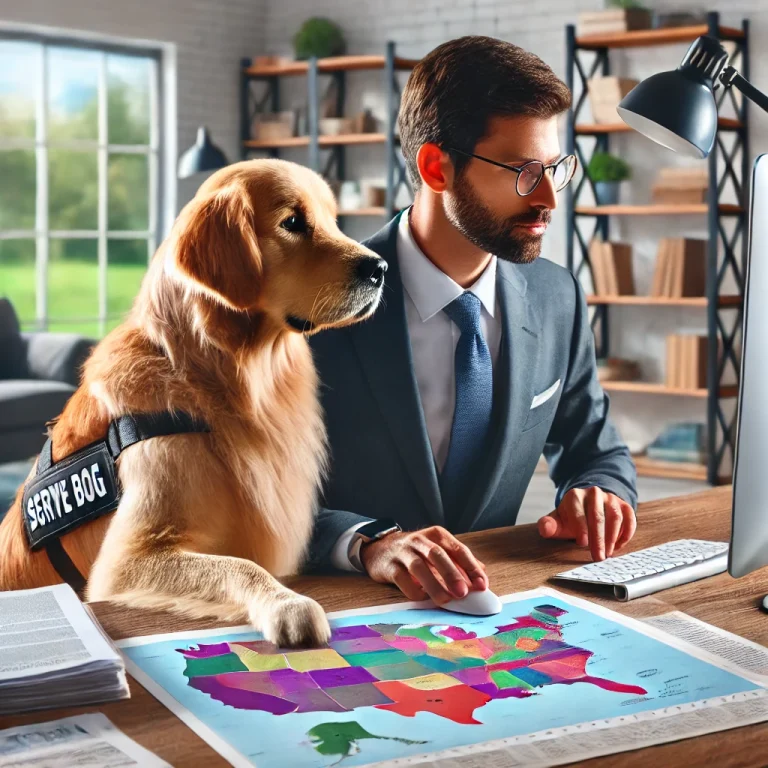Service dogs play an essential role in assisting individuals with disabilities, providing them with the necessary support to lead more independent lives. However, despite the legal protections in place, service dog handlers often face denials and discrimination. Understanding your service dog legal rights and knowing how to handle service dog discrimination and access issues is crucial. This comprehensive guide will help you navigate these challenges, ensuring that your rights are protected effectively.

Understanding Service Dog Legal Rights
The Americans with Disabilities Act (ADA)
The ADA is a federal law that provides broad protections for individuals with disabilities. Under the ADA, service dogs are allowed to accompany their handlers in public places, including restaurants, hotels, stores, and public transportation. This law ensures that service dog handlers are not discriminated against based on their disability or their use of a service dog.
The ADA defines a service dog as a dog that is individually trained to perform tasks or do work for a person with a disability. These tasks can include guiding individuals who are blind, alerting individuals who are deaf, pulling a wheelchair, alerting and protecting a person who is having a seizure, or reminding a person with a mental illness to take prescribed medications.
Key Provisions of the ADA
- Public Access: Service dogs are allowed in any area where the general public is permitted. This includes businesses, government buildings, and non-profit organizations. These establishments must allow service dogs to accompany their handlers unless the dog’s presence would fundamentally alter the nature of the business or pose a direct threat to health and safety.
- Inquiries Allowed: Staff may ask two questions: (1) Is the dog a service animal required because of a disability? and (2) What work or task has the dog been trained to perform? They cannot ask about the person’s disability, require medical documentation, or ask for a demonstration of the dog’s abilities.
- No Extra Fees: Businesses cannot charge a fee or require a deposit for service dogs. However, the handler is responsible for any damage caused by their dog. Additionally, service dogs must be under control at all times, either through voice commands, signals, or a leash.
State Laws
In addition to the ADA, many states have their own laws regarding service dogs. These laws can provide additional protections and cover areas not explicitly addressed by federal law. Familiarize yourself with your state’s specific regulations to ensure comprehensive protection. Some states may offer broader definitions of service animals or include protections for emotional support animals.
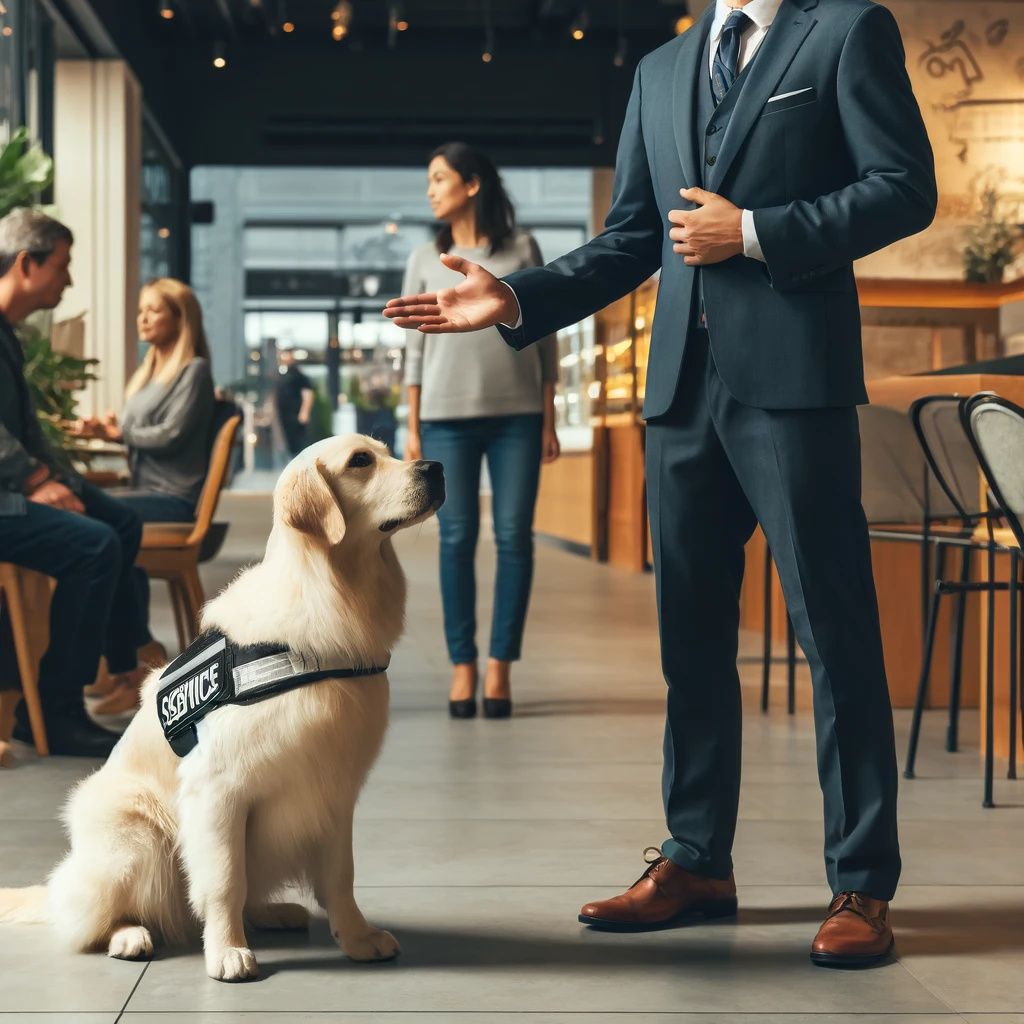
Handling Service Dog Discrimination
Stay Calm and Educate
When faced with denial or discrimination, it’s essential to remain calm. Politely explain your rights under the ADA and how your service dog is legally allowed in public spaces. Providing a brief explanation and answering any questions can often resolve misunderstandings quickly. Education is a powerful tool in combating ignorance and fostering understanding.
Carry Documentation
While the ADA does not require service dog handlers to carry documentation, having an identification card, doctor’s note, or a copy of the ADA regulations can be helpful. These documents can provide quick reference and support your case when educating others about your rights. Although not mandatory, these documents can facilitate smoother interactions and help clarify your dog’s role as a service animal.
Request to Speak to a Manager
If initial explanations do not resolve the issue, ask to speak to a manager or supervisor. Higher-level staff are often more familiar with ADA regulations and can make more informed decisions. Managers typically have more training and experience in handling such situations, which can lead to a quicker resolution.
Document Incidents
If you face discrimination or denial of access, document the incident. Note the date, time, location, and names of individuals involved. This information can be crucial if you need to file a complaint or take legal action. Keeping detailed records ensures that you have all the necessary information to support your case and demonstrate the pattern of discrimination if it persists.
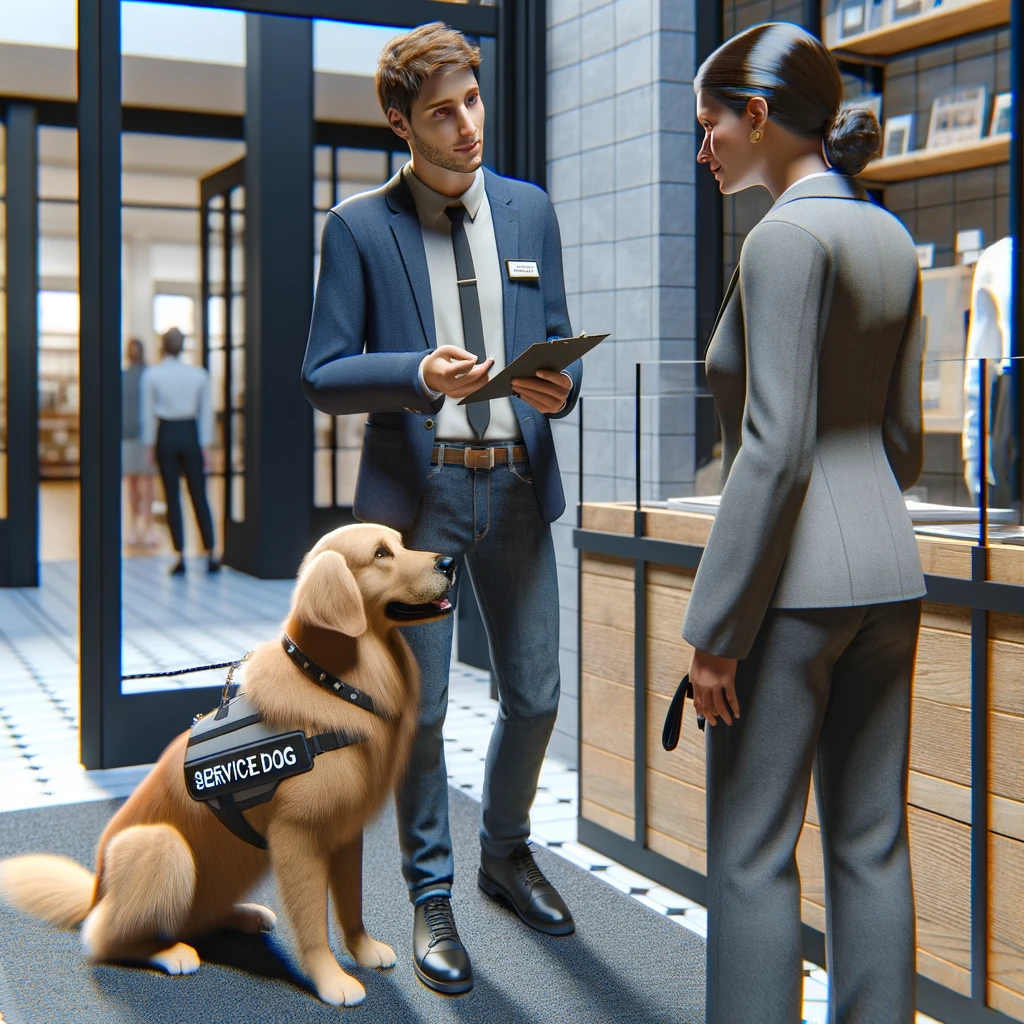
Addressing Service Dog Access Issues
Know Your Rights
Knowledge is power. Ensure you are well-versed in both federal and state laws regarding service dog access. This knowledge will empower you to assert your rights confidently and effectively. Understanding the full extent of your legal protections helps you navigate various situations and advocate for yourself and your service dog.
Be Prepared for Common Scenarios
Prepare for situations where access might be denied. Practice your responses to ensure you can handle these situations calmly and assertively. Common scenarios include being denied entry to a restaurant, hotel, or public transportation. Role-playing these scenarios with a friend or family member can help you develop confident and clear responses.
Document Incidents
If you face discrimination or denial of access, document the incident. Note the date, time, location, and names of individuals involved. This information can be crucial if you need to file a complaint or take legal action. Keeping detailed records ensures that you have all the necessary information to support your case and demonstrate the pattern of discrimination if it persists.
File a Complaint
If informal resolution efforts fail, you may need to file a formal complaint. Complaints can be filed with the Department of Justice (DOJ) or your state’s civil rights agency. Provide detailed information and any supporting documentation to strengthen your case. Filing a complaint is a formal way to address discrimination and can lead to investigations and potential penalties for violators.
Seek Legal Assistance
In severe cases of discrimination, legal assistance may be necessary. Contact disability rights organizations or attorneys specializing in disability law for guidance and support. They can help you navigate the legal process and advocate for your rights. Legal professionals can offer expert advice and represent you in court if necessary, ensuring that your rights are upheld.
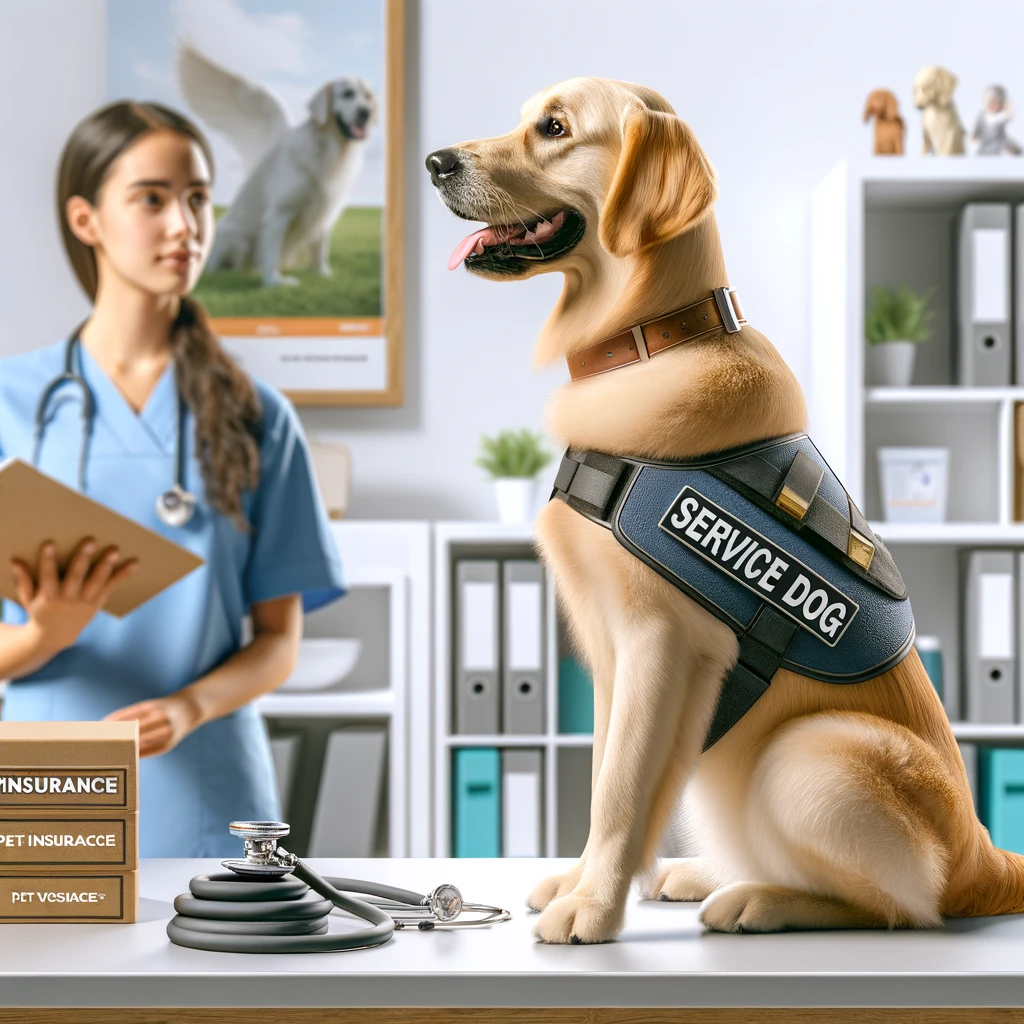
The Importance of Pet Insurance and Service Dog Products
Pet Insurance
Investing in pet insurance is crucial for maintaining your service dog’s health and effectiveness. Pet insurance covers unexpected medical expenses, ensuring your dog receives the best care without causing financial strain. Look for policies that cover routine care, emergencies, and chronic conditions. Having pet insurance provides peace of mind, knowing that you can afford the necessary treatments and care for your service dog.
Service Dog Products
High-quality service dog products, such as vests, harnesses, and identification tags, are essential. These products ensure your dog is comfortable, easily identifiable, and well-equipped for their tasks. ServicePupSolutions.com offers a range of products to support your service dog’s training and daily needs. Investing in durable and reliable gear helps your service dog perform their duties effectively and safely.
Self-Training Options
Self-training your service dog can be a rewarding and cost-effective option. ServiceDogOwners.com provides valuable resources and guidance for training your service dog. These resources help you tailor the training to your specific needs and ensure your dog is well-prepared to assist you. Self-training allows for a personalized approach, strengthening the bond between you and your service dog while ensuring they are trained to meet your unique requirements.
Conclusion
Protecting your rights as a service dog handler involves understanding the legal protections in place and knowing how to handle discrimination and access issues effectively. By staying informed, prepared, and assertive, you can ensure that you and your service dog receive the respect and access you deserve. Investing in pet insurance and high-quality service dog products further supports your dog’s health and effectiveness.
For more resources and high-quality service dog products, visit ServicePupSolutions.com. And for those interested in self-training options, explore the comprehensive guides available at ServiceDogOwners.com.
Searching for a way to boost your income while keeping your service dog by your side? Learn how Digital Marketing and Affiliate Marketing can launch your Side Hustle or new career and increase your earnings alongside your loyal companion. Click Here to find out more and start your journey today!



